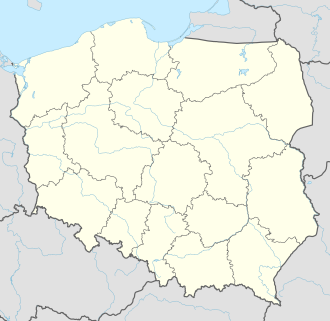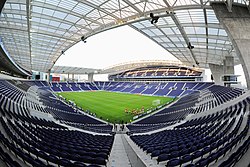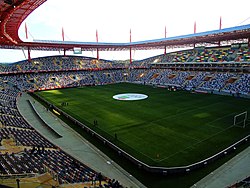Confirmed bids
Four submitted bids have been made by the deadline of 28 August 2025 to host the tournament:
Denmark and Sweden
After the two nations failed to secure the hosting rights for 2025 alongside Finland and Norway, the president of the Swedish Football Association, Fredrik Reinfeldt, stated that they would consider potentially bidding in the future. [3] On 8 February 2024, ahead of the UEFA Congress in Paris, Denmark and Sweden formally expressed their interest in hosting the 2029 tournament. [4] [5]
Although the four Nordic countries initially planned to bid jointly once again, the evaluation report from the 2025 bidding process advised that the likelihood of success would increase with only two hosts. As a result, Denmark and Sweden chose to pair up. [6] [7] Norway was reportedly disappointed by this decision and indicated a desire to negotiate with the two nations about joining the bid. [8] [9] However, on 24 April 2024, Denmark and Sweden officially decided against involving Norway in their bid. [10]
Subsequently, following the release of UEFA's hosting requirements, concerns arose regarding Denmark's stadium infrastructure, particularly the lack of venues meeting the minimum capacity standards. [11] [12] Danish Football Association director Erik Brøgger Rasmussen acknowledged that said stadiums could be expanded to meet these requirements. [13] In addition, the Danish Football Association has held negotiations with Aarhus Municipality and Copenhagen Municipality regarding the construction of a new stadium with a capacity of 20,000 seats. [14] [15] The Danish federation president has stated that the lack of a fourth venue meeting capacity requirements is not a problem. [16] UEFA's new vice president, Jesper Møller also expressed concerns about Denmark's stadiums. [17] Eventually, construction on a new stadium replacing Aarhus Stadium began. [18]
Denmark had proposed Copenhagen, [19] [20] Brøndby, [21] Aarhus, [22] [23] Herning and Odense as possible venues. [24] [25] Venues in Gothenburg, [26] Malmö, [27] [28] and two stadiums in Stockholm [29] [30] were the proposed venues in Sweden. Viborg was also considered by Denmark, but this never materialised. [31] [32]
Regarding Gothenburg, hosting would cost the city 40 million KR [33] Stockholm has also announced a budget of 80 million KR. [34]
Denmark and Sweden have both lobbied in Switzerland during the 2025 edition to try and garner votes. [35] The lack of government funding from Sweden, alongside the lack of stadiums meeting requirements, has been considered an issue for the Swedes. [36]
In July 2025, residents in Stockholm convincingly supported the candidacy, with a profit of 927 million KR projected if Stockholm receives the hosting rights. [37] [38]
On 12 August 2025, the Copenhagen city council unanimously approved their financial backing of 30 million DKK for the bid. [39] [40]
On 28 August 2025, both countries submitted their official joint application for the tournament. The previously aforementioned venues were included bar Herning [41] in Denmark have been selected for the bid. [42] [43] Denmark and Sweden aspire to fill out their stadiums and have a total attendance of almost one million. [44] [45] The Danish government has set aside 10 million for the tournament.
On 5 November 2025, the Swedish government announced they would fund the tournament if the bid wins. [46]
Copenhagen, Aarhus and Odense are receiving legal advise for the bid by Horten. [47]
Danish actress, Birgitte Hjort Sørensen, alongside chairman of the Swedish Football Association, Simon Åström, performed the presentation. [48]
The opening match would be in Copenhagen while the final would be in Stockholm.
Denmark previously hosted the UEFA Women's Euro 1991, while Sweden has an extensive history of hosting major international football tournaments, including the men's 1958 FIFA World Cup, UEFA Euro 1992, the 1995 FIFA Women's World Cup, UEFA Women's Euro 1997 (co-hosted with Norway), and UEFA Women's Euro 2013 as sole host.
| | | | |
|---|---|---|---|
| Strawberry Arena | Ullevi | 3Arena | Stadion |
| Capacity: 50,653 | Capacity: 43,000 | Capacity: 30,000 | Capacity: 21,000 |
 |  |  |  |
| | | | |
| Parken Stadium | Skovens Arena | Brøndby Stadium | Odense Stadium |
| Capacity: 38,190 | Capacity: 24,000 (new) | Capacity: 23,400 | Capacity: 13,573 |
 |  |  |  |
Germany
The German Football Association announced on 20 September 2024 that they would make a bid for Euro 2029 and submit their interest to UEFA by the deadline of 24 September. [49] [50] DFB president Bernd Neuendorf said in a statement the bid was the organisation's "flagship project" which will give an "additional boost" to women's football in Germany. [51]
On 28 November 2024, it was announced that the following 17 cities have submitted applications to host matches: Berlin, Bremen, Cologne, Dortmund, Düsseldorf, Essen, Frankfurt am Main, Freiburg, Gelsenkirchen, Hamburg, Hanover, Leipzig, Mainz, Munich, Rostock, Stuttgart and Wolfsburg, [52] [53] with Augsburg and Nürnberg having already rejected the proposition of hosting games. [54] [55]
In January 2025, 15 cities had submitted documents in time. [56]
On 19 February 2025, the DFB announced the shortlist of host cities: Berlin, Cologne, Dortmund, Düsseldorf, Frankfurt, Gelsenkirchen, Hanover, Leipzig, Munich, Rostock and Wolfsburg. [57]
The bid logo and slogan for the tournament; Together WE Rise, was unveiled on International Women's Day. [58] The DFB stated that they want to use this tournament for the social progression, and aim to have a record one million spectators attend the tournament. [59] [60]
On 13 June 2025, the DFB confirmed the host cities for their bid dossier. [61] [62] Berlin, Gelsenkirchen [63] and Rostock were not chosen. In regards to Berlin, spokeswoman for the Senate Department for the Interior and Sport Sabine Beikler stated that "Berlin is not prepared to take financial and contractual risks as part of the application."
Members of the DFB expert committee have viewed the applications from Poland and Scandinavia as their main rivals. [64]
Dortmund will host the opening match while Munich will host the final.
Germany previously hosted the men's 1974 FIFA World Cup, the men's UEFA Euro 1988, UEFA Women's Euro 1989, UEFA Women's Euro 2001, the men's 2006 FIFA World Cup, 2011 FIFA Women's World Cup and the men's UEFA Euro 2024.
| Munich | Dortmund | Frankfurt | Düsseldorf |
|---|---|---|---|
| Allianz Arena | Westfalenstadion | Waldstadion | Merkur Spiel-Arena |
| Capacity: 70,000 | Capacity: 66,099 | Capacity: 53,800 | Capacity: 51,031 |
 |  |  |  |
| Hanover | Cologne | Leipzig | Wolfsburg |
| Niedersachsenstadion | RheinEnergieStadion | Red Bull Arena | Volkswagen Arena |
| Capacity: 49,000 | Capacity: 45,965 | Capacity: 45,228 | Capacity: 26,000 |
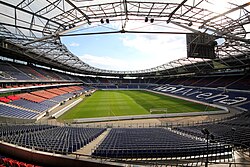 | 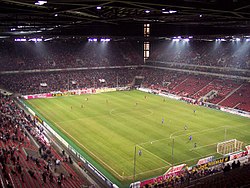 |  |  |
Poland
After failing to receive the 2025 hosting rights to Switzerland, on 26 July 2024 president of the Polish Football Association, Cezary Kulesza, announced that Poland will bid once again to host the tournament in 2029. [65]
Białystok, [66] [67] Gdańsk and Wrocław (who stated they wanted to host the final) [68] have stated their intent to be part of the bid. [69] [70] In June 2025, the Polish government approved the bid. [71] In July 2025, Poland's proposed venues were announced with seven cities hosting matches. [72] [73] [74] The final would be at the Stadion Narodowy in Warsaw. Łódź, Bielsko-Biała and Poznań were considered as options, but didn't materialise. [75] [76] [77]
The Poles have been lobbying in Switzerland during the 2025 edition. [78]
On 21 October 2025, reports emerged that Legia Warsaw's owner, Dariusz Mioduski, has not signed the agreement that would allow the Polish Army Stadium to be used. [79] [80]
Poland previously hosted the men's UEFA Euro 2012 (co-hosted with Ukraine), the 2019 FIFA U-20 World Cup, and the 2026 FIFA U-20 Women's World Cup as sole host.
| Warsaw | Wrocław | Gdańsk | Kraków |
|---|---|---|---|
| Stadion Narodowy | Wrocław Stadium | Gdańsk Stadium | Henryk Reyman Municipal Stadium |
| Capacity: 56,826 | Capacity: 42,771 | Capacity: 41,620 | Capacity: 33,326 |
 |  |  | 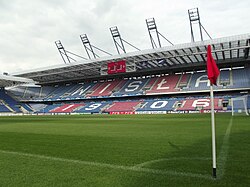 |
| Zabrze | Warsaw | Białystok | Szczecin |
| Arena Zabrze | Polish Army Stadium | Stadion Miejski | Florian Krygier Municipal Stadium |
| Capacity: 31,871 | Capacity: 31,103 | Capacity: 22,432 | Capacity: 21,163 |
 |  |  |  |


